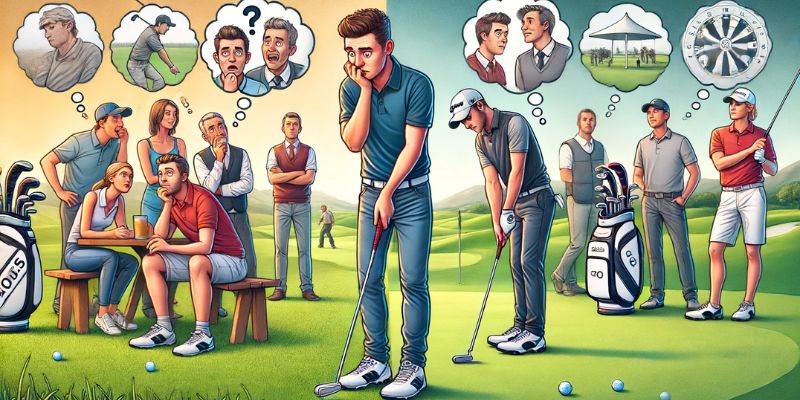Psychological differences between amateur and pro golfers are often as significant as the technical skills that separate these two groups.
Understanding these mental disparities can help amateurs enhance their game and manage the psychological demands of competitive play more effectively.
Mindset of Winning Golfers
The mindset of winning golfers, whether amateur or professional, distinguishes them from their peers.
Psychological differences between amateur and pro golfers manifest primarily in their approach to the game.
Pros typically exhibit a growth mindset, a psychological trait that involves seeing challenges as opportunities to improve rather than obstacles.
This mindset encourages resilience and a continuous quest for mastery, which is crucial in a sport as mentally demanding as golf.
Professionals also maintain a high level of focus and have the ability to remain present during each shot.
They train not only their bodies but their minds, understanding that mental fortitude is just as important as physical skill.
Coping with Pressure in Golf
Coping with pressure is another area where the psychological differences between amateur and pro golfers are evident.
Professional golfers often employ specific strategies to manage stress and anxiety on the course.
These strategies include visualization techniques, routine setting, and focused breathing exercises.
Pros know how to compartmentalize each shot with their club, maintaining a steady performance regardless of external pressures.
Amateurs, on the other hand, might struggle with the mental aspect of golf, particularly in competitive scenarios.
Without effective strategies to manage stress, their performance can suffer significantly under pressure.
Mental Training Techniques
To bridge the psychological differences between amateur and pro golfers, mental training techniques are essential.
Both amateurs and pros can benefit from mental conditioning, though the methods may vary slightly by skill level. Common techniques include:
- Goal Setting: Establishing clear, achievable goals helps maintain focus and motivation.
- Mindfulness and Meditation: These practices enhance concentration and calm, helping golfers of all levels stay mentally sharp.
- Cognitive Behavioral Techniques: These help players challenge negative thoughts and develop a more constructive mindset.
Incorporating technology, such as biofeedback tools and mental game analytics, can also provide insights into a player’s psychological state, allowing for more personalized mental training strategies.
Understanding the psychological differences between amateur and pro golfers provides valuable insights into improving mental resilience and overall performance on the golf course.
Whether through focused mental training techniques, effective stress management strategies, or the supportive use of technology, golfers at all levels can enhance their mental game to match their physical skills.
What mental technique is most crucial for improving golf performance?
Focus and concentration are paramount. Techniques that enhance these areas, such as mindfulness meditation, can significantly impact performance.
How do professional golfers handle bad shots or rounds?
Professionals typically employ a short memory for poor shots and focus on the task at hand, learning from mistakes without letting them impact subsequent performance.
Can technology help improve the mental game of golf?
Yes, various technologies, including mental game analytics and biofeedback devices, can help golfers understand their stress triggers and learn to control their responses more effectively.

